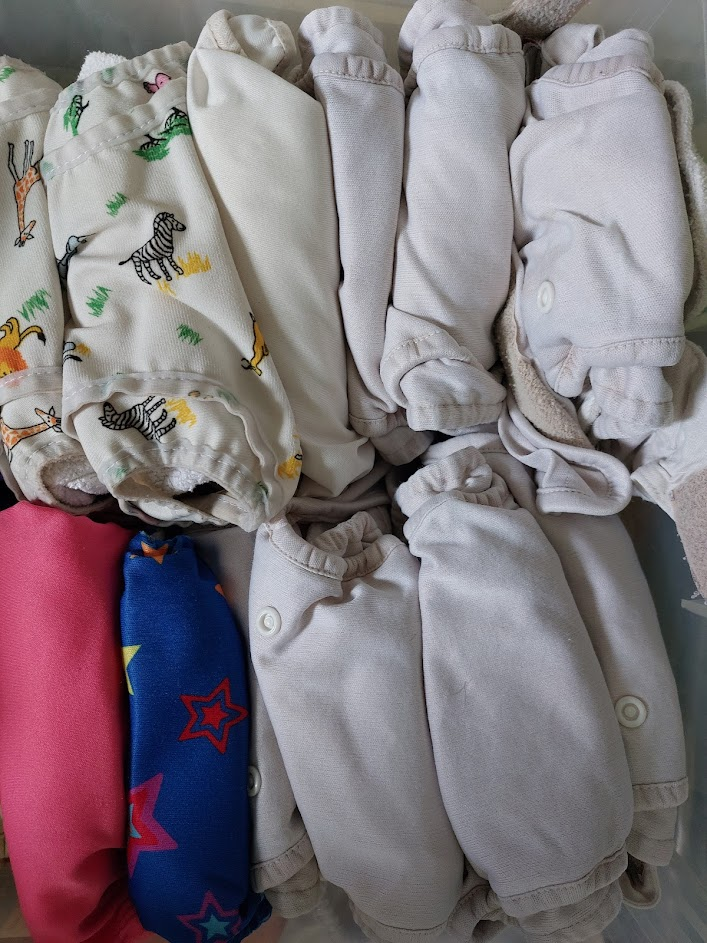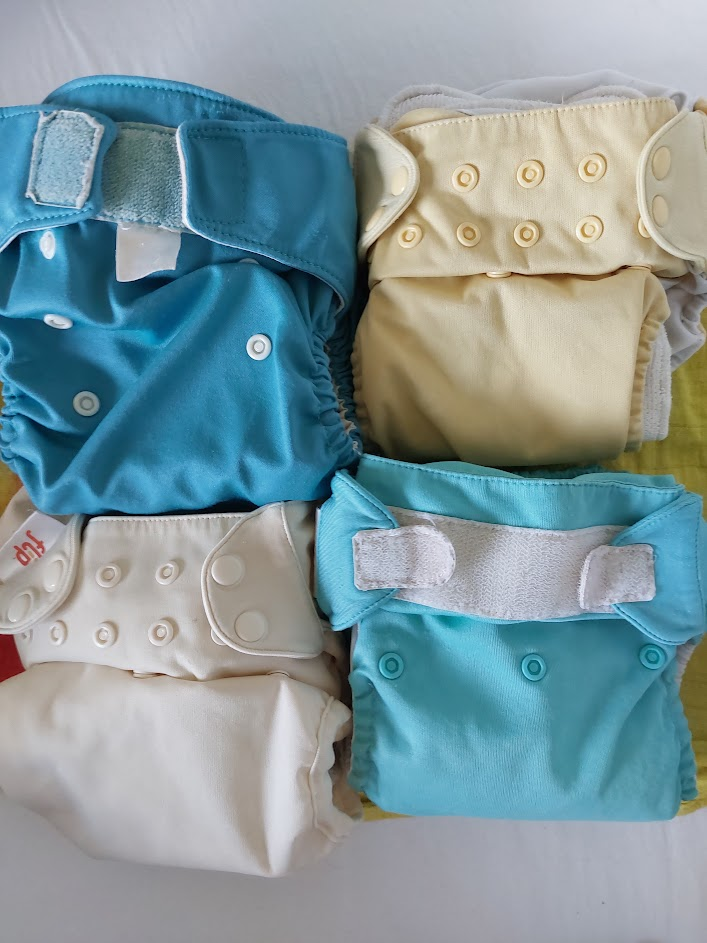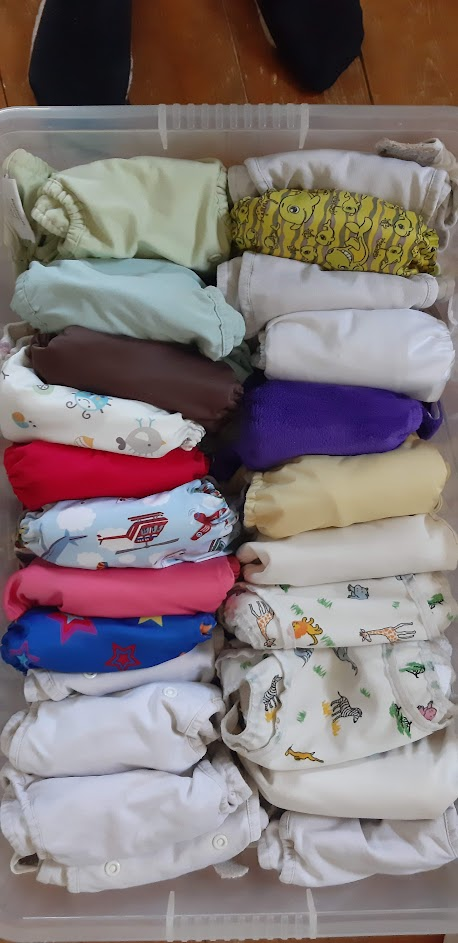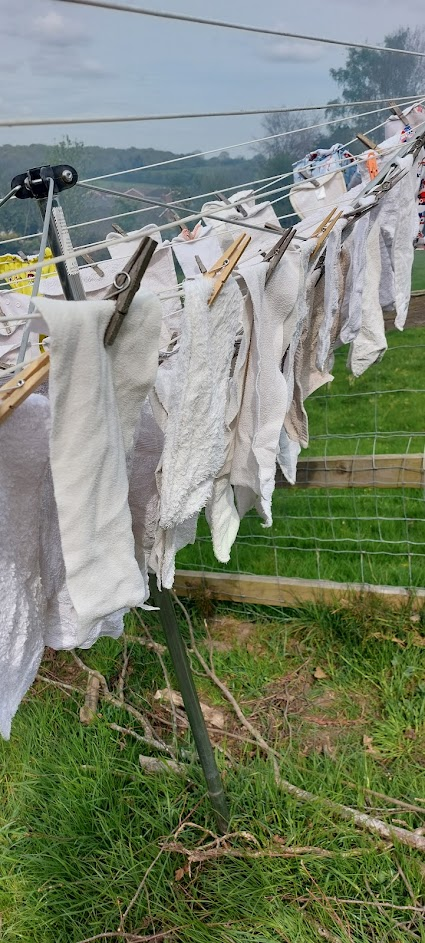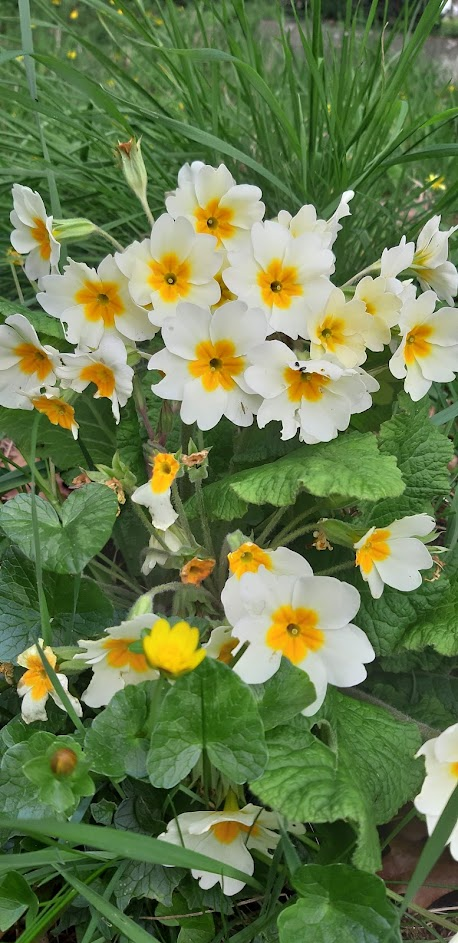My journey with cloth nappies has been a bit of a bumpy one, there have been times when I was so puritanical about using them that I decided we should even use them whilst camping. I had visions of my lovely cloth nappies swinging from the guide ropes, drying in the sun. The reality however was rain, nappy leaks in a sleeping bag and a lot of time and money spent on the camp site laundrette and tumble dryer. Not a fun experience on reflection.
At other times I have shunned cloth nappies altogether. For example when my first son was born I had
all the good intentions of using cloth and had my lovely sets of new born cloth
nappies ready to go, but the reality was that I was so overwhelmed with
motherhood and trying to look after this wriggly baby that cloth nappies became
just another new, difficult thing that I had to learn. One too many things, so for a while I guiltily
and shamefacedly used disposables.
I once attended a cloth nappy meet in a cool area of the
town I used to live in. The event was
really lovely and I was thrilled to meet other mothers who were like minded, I
felt like I had met my tribe. But I couldn’t
help but feel daunted by some of the mothers’ approaches to cloth bumming, one
mum was like a ninja as she wrapped and tied her baby’s bum in her organic wool
cloth nappy like someone folding origami!
I couldn’t live up those standards.
I now seem to have settled into a nice balance of using both
cloth and disposable, who knew it was ok to use both! But it has taken me a
while to let go of the perfection I thought was required and embrace an
acceptance that life is not perfect.
Accepting that I don’t need to be perfect with my approaches to motherhood
parenting has given me a little more peace and made life just a little bit more
enjoyable.
Perhaps you have thought about using cloth nappies saw one of those ninja mums and decided it was all too overwhelming. Or maybe you thought they were too expensive, messy or time consuming, here I will show you have none of these things is necessarily true and how you can enjoy using cloth nappies with your baby, without guilt and without loosing your marbles.
Why use cloth nappies?
There are three great reasons to use cloth nappies, they can be better for the environment, they can save you money and they can be healthier for your baby, let me explain:
I have been using cloth nappies on and off for ten years and
some of the nappies I used with my first baby are still going with my
forth. Imagine how many hundreds of
disposable nappies going to landfill that has saved! Not to mention the manufacturing, packaging
and transportation of disposable nappies. Disposable nappies take hundreds of
years to break down, even the more eco friendly versions whereas a single cloth
nappy can be reused hundreds of times. Cloth nappies are up to 40% less harmful
to the environment than disposable nappies and can reduce household waste by a
massive 50%. What is more, when washed
at low temperatures and line dried cloth nappies also create less carbon
emissions, if you acquire them second hand, use them with multiple children or
pass your nappies on after your children are potty trained then you’re reducing
your impact even further. If you add into this using washable wipes then you
are further reducing your environmental impact.
Another great reason to use cloth nappies is the financial
saving. You might be surprised you can
save money on cloth nappies if you have seen the price of them new in the
shops, why would you buy one cloth nappy
when you can get a pack of 40 disposables for the same price? Well over the last 10 years I have probably
invested no more that £50 on cloth nappies.
This is because I have reused the ones I first bought to their death, I
have bought them second hand and I have gratefully accepted cloth nappies from
my friends whose children were done with them. I do no more than two extra machine washes per
week to keep on top of the washing and I try to line dry them in the warmer,
dryer months so electricity costs are minimised. I am absolutely certain that
using cloth nappies has saved us a significant amount of money. If you need to buy nappies new then you will
find many sources of cheaper cloth nappies than the supermarket. I have tried many brands over the years and
have had success with both more pricey and cheaper brands. You don’t need any special detergent to wash
your nappies (check the brand as some mainstream detergents can’t be used) and
you don’t need to use any special settings on your machine. I just whack them
in on a 60 cotton wash with ecover non-bio and that has served me well over the
years.
Washable cloths can also save you money, you don't have to spend a lot on purpose made wipes, just use cheap flannels. I use a mix of these and some old washable liners, I've also used bits of cut up fleece and towels in the past.
Finally cloth nappies can be better for your baby because
your baby’s skin is in contact with materials that contain fewer toxic
chemicals and many cloth nappies are more breathable than disposable. The ultimate nappy might be an organic cotton
or bamboo cloth nappy, but even those with microfiber and polyester fabrics
release fewer toxic chemicals that can harm your baby especially if they are
second hand. Also by using cloth we are
able to leave a better planet to our children for the future.
It could be easy to look at all that information and feel
bad for using disposable, but it’s important to remember that we all only do as
much as we can do and even just replacing a few disposables here and there with
cloth is a small help. None of us is perfect, we are all just trying to be a
better mum and a better person than the day before, and sometimes we are just
trying to survive.
Cloth bum with ease:
If you are thinking that using cloth nappies must take a lot
more time than using disposables, let me tell you that this isn’t necessarily
true. Of course at the point of use it
does take more time to process a cloth nappy than to just whip a disposable out
of the bag, but when you factor in the cost of disposables and the fact someone
has to work to earn the money to keep buying them week on week then the time
saving value of disposable doesn’t seem so great. All that to say, there is additional time
required to process the cloth nappies, and you might feel like you really can’t
manage on more thing, and that’s ok, but the reality is that the extra time
needed needn’t be exorbitant. I keep the
time spent washing and drying my cloth nappies down with these simple
techniques:
·
I dry store my nappies in a bucket with a tight
fitting lid. This eliminates smell but also means that I can do a full machine
load in one go rather than lots of small washes. I do no more than two washes of cloth nappies
per week, I make sure all Velcro tabs are folded down before the nappies go
into the bucket then as I empty them into the machine I unfold or untuck any
pads or stuffers.
·
Hanging up nappies on the washing line takes no
more than about 10 minutes, so with two loads that’s just 20 minutes per week,
so not a huge amount of additional time.
If you use the tumble dryer than this time is reduced even further as
you just transfer the whole lot into the dryer, switch on and walk away.
·
Finally using cloth wipes rather than
disposables is a great time saver as far fewer wipes are required on a poopy
bum when you use washables. By this I
mean you usually only need one wipe per poop, and the actual process takes less
time and the fluffy fibres on the cloth and the size means than one or two
wipes over the bum and it’s done. You
can also save time by whacking them in the washing machine with the nappies.
I imagine you expect cloth nappies to be a bit gross to deal
with but over the years I have developed techniques that have made dealing with
the dirties much easier.
·
To begin with, when I remember, I carry a bag
around with me to put the poopy nappy into if I am changing it on the go. Sometimes I forget and then end up in a
sandwich bag at the bottom of my rucksac for a week!
·
As I said above I dry store my nappies in a
bucket with a tight fitting lid which keeps in the smell, when it then comes to
washing the nappy I can just toss them all into the machine. Some people choose to wet store the nappies
in a bucket of water with special detergent but I never liked the idea of
transferring dripping nappies to the washing machine then having to deal with
the poopy soup left behind in the nappy bucket.
·
Before your baby is six months old it is simple
to just put the nappy, poop and all straight into the machine. But once they are weaned and producing proper
poops these need to be removed from the nappy first. Some people find using a disposable nappy
liner makes this a much easer process but I found I could fairly simply flick
the poop into the toilet from the nappy if it was dry enough.
· Wiping a baby’s bum with a washable wipe is far less messy than with a disposable, your fingers don’t get poop on them because the cloth is so much thicker and larger than a disposable. Far more hygienic and quicker.
So remember if you feel drawn to using cloth nappies, there
is no need to be a perfectionist. You
don’t need to stick religiously to one brand, or use the right boosters with
the right nappy. After ten years of cloth
nappy use I am now happy to use any thing I have lying around to stuff a nappy,
mixing and matching brands and types and I’ve even been known to use old flannels
when I ran out of stuffers! So long as it is absorbent I don’t care what type I
stuff it with.
Using cloth nappies doesn’t have to be all or nothing. Even
if you are only reducing your use of disposable nappies but one or two per day,
that is still going to have an impact over the years. I used to be so militant at times, but I have
come to realise that, when it comes to enjoying life, all things in moderation if
a good rule of thumb, and it is ok to not be perfect. I now mostly use disposables at night and cloth
in the day, sometimes I use disposables in the day too like if we are going out
on a day trip and I don’t want to carry the dirty cloth nappy in my rucksac all
day, I don’t feel guilty about it because I know I am doing the best I can. I have made peace with not being perfect.

